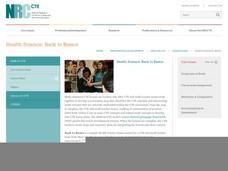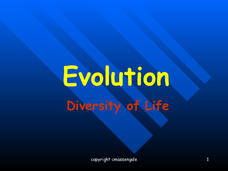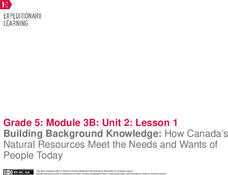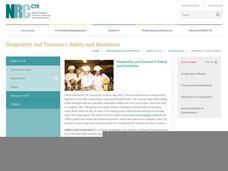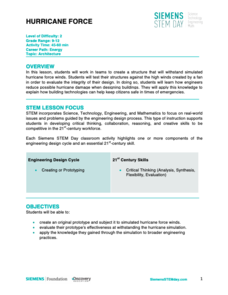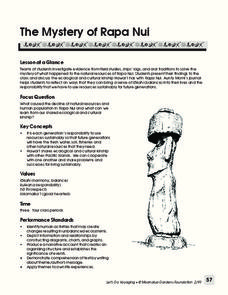Royal Society of Chemistry
The 400m Event—Chemistry and Sport
How do Olympic runners succeed in physically demanding events like the 400-meter dash? Physiology scholars explore the relationship between acids, bases, and the muscular system through a scenario-driven activity. The lesson focuses on...
National Nanotechnology Infrastructure Network
Is Measuring an Art or a Science?
Not only do future engineers learn the difference between accuracy and precision, they also get some hands-on experience using different measuring tools.
Carnegie Mellon University
Marcellus Shale: Who Pays?
After viewing short clips of unfortunate events, your class will consider two sides of a homeowner's court case, and then learn about the Marcellus shale deposit beneath the state of Pennsylvania and the hydraulic fracturing process. In...
National Research Center for Career and Technical Education
Health Science: Back to Basics
This lesson focuses on unit conversion, proportions, ratios, exponents, and the metric system. Discuss measurement with your math class and demonstrate how to solve several health-science word problems. Give learners a chance to visit an...
NOAA
Sustaining Our Ocean Resources
Lead young scientists on an investigation of fishery practices with the final installment of this four-part unit. Using a PowerPoint presentation and hands-on simulation, this lesson engages children in learning how fish populations are...
Biology Junction
Evolution – Diversity of Life
Scientists noticed animals with backbones share similar bone structure despite having different forms, such as fins, arms, and wings. Young scientists gain an appreciation for evolution by understanding the history of the theory. They...
EngageNY
Building Background Knowledge: How Canada’s Natural Resources Meet the Needs and Wants of People Today
Learners follow along as the teacher reads Products of Mining in Canada: From Batteries to Vehicles aloud. They then discuss the meaning of key terms and determine the gist of the text. Pupils do a second read and complete a graphic...
NOAA
Ocean Exploration
Where am I? The second installment of a 23-part NOAA Enrichment in Marine sciences and Oceanography (NEMO) program starts with pupils guessing the years in which major ocean exploration events took place. The lesson then focuses on how...
NOAA
El Niño
El Nino, La Nina ... and the Santa Maria? The 11th installment of a 23-part NOAA Enrichment in Marine sciences and Oceanography (NEMO) program explains the mechanism of El Nino/Southern Oscillation. Pupils use previous data to determine...
US Environmental Protection Agency
Non-Point Source Pollution
Investigate the different types of pollution that storm drain runoff carries into oceans, lakes, rivers, and streams with this class demonstration. Using an aquarium and an assortment of everyday items that contaminants like motor oil,...
Glynn County School System
Cosmology
The past, the present, and the future ... there's so much to discover about the galaxy. Scholars learn about the creation of the universe, its current structure, and how it is changing. The PowerPoint presentation begins with a...
Columbus City Schools
ABC: Acid Base Chemistry
Bubble, bubble, boil and trouble! What causes common substances like baking soda and vinegar to react the way they do? Welcome your junior chemists to the wonders of acid-base chemistry using a comprehensive and fun resource. Engage them...
NASA
Erosion and Landslides
A professional-quality PowerPoint, which includes links to footage of actual landslides in action, opens this moving lesson. Viewers learn what conditions lead to erosion and land giving way. They simulate landslides with a variety of...
National Research Center for Career and Technical Education
Hospitality and Tourism 1: Safety and Sanitation
Math and science come alive in this career-related lesson on sanitation. Along the way, learners explore bacterial growth rates using exponential notation and graphs. A link to a very brief, but vivid video shows just how quickly these...
Chicago Botanic Garden
Seasons of a Plant
The third in a series of six lessons is an engaging three-part activity defines that discusses phenology, focusing on the cyclic seasons of plants. Pupils then observe phenology outside before determining how climate change can...
EngageNY
Relationships Between Key Scientific Concepts: Planning What Causes Earthquakes
That is ground shaking news! Scholars read Earthquake in multiple reads to determine the gist, identify cause and effect relationships, and understand vocabulary. Learners complete graphic organizers to describe what happens before and...
Virginia Department of Education
Weather Patterns and Seasonal Changes
Get your class outside to observe their surroundings with a lesson highlighting weather patterns and seasonal changes. First, learners take a weather walk to survey how the weather affects animals, people, plants, and trees during...
Channel Islands Film
Island Rotation: Lesson Plan 4
Foster's Rule? Allopatric speciation? After watching West of the West's documentary Island Rotation, class members use Venn diagrams to compare endemic species on the Channel Islands with mainland related species. They then create a...
Knoxville Art Museum
Lee Walton: Codes in Drawings
Familiar with the systems-based sports drawing of experimental artist Lee Walton? If so, this drawing exercise if for you. Young artists observe an activity over time, develop a coded language for the activity, and then draw a...
American Museum of Natural History
Create Your Own Time Capsule
The corona virus pandemic is indeed a historic event. A time capsule activity permits young historians to document these days of social distancing, remote learning, and quarantine by collecting artifacts that capture what their lives are...
Discovery Education
Hurricane Force
It's important to make sure houses can withstand winds. A hands-on activity has learners create a structure out of household materials. They use a fan to simulate hurricane-force winds to see if their structures can withstand the...
National Park Service
It Was a Very Good Year
Waterton-Glacier International Peace Park includes whitebark pines that are over 1,200 years old, meaning they have been there since before medieval times. The second lesson of five details how to read tree rings for climate change and...
New Mexico State University
Lab 6: Kepler's Laws
A 15-page package thoroughly teaches your physics or astronomy learners about Kepler's three laws of planetary motion. Each one is stated and explained. Class members answer questions, solve problems, and participate in the classic...
Moanalua Gardens Foundation
The Mystery of Rapa Nui
What caused the collapse of the environment on Rapa Nui (Easter Island)? Who constructed the Moai? What was their purpose? Class members assume the role of investigators and use evidence drawn from field studies, ships' logs, and...





